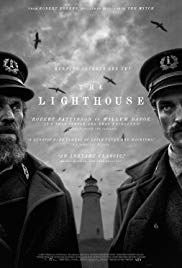
THE LIGHTHOUSE
US, 2019, 109 minutes, Black and white.
Robert Pattinson, Willem Dafoe, Valeriia Karaman.
Directed by Robert Eggers.
Quite a lot of critical admiration for this grim film. For many of those who admire the film, it still could be something of an endurance to sit through, a hard film. Which means that the average audience may not have the patience or stamina to stay with it.
There have been a number of stories about isolation on lighthouses, especially a film which was not entirely different although it involved crimes and criminals, Keepers/The Vanishing, with Gerard Butler and Peter Mullan.
Audiences anticipated something different from writer-director, working with his brother, Robert Eggers, because of his striking horror film, The Witch. The director continues in this mysterious vein.
The choice was made to film in black and white and this was rewarded by an Oscar cinematography nomination.
To say that the film is bleak is an understatement. Two keepers arrive on an island, expecting to be relieved a month later. One is a young man, played effectively by Robert Pattinson (though with a varying accent) who is allotted the hard work, the menial tasks, continuous hard labour. The other is an older man, the regular light keeper, also played effectively by Willem Dafoe. He proves himself a hard taskmaster, who also restricts visit to the light at the top of the tower to himself where he behaves very strangely, glimpsed naked by the young man.
On the one hand, the narrative plays directly, the work on the island, the days passing, the interactions between the two men, sometimes friendly, sometimes severe, the young man wanting to go up to the light, the older man forbidding it, also writing in his log which he locks in his desk, tantalising for the younger man.
On the other hand, the narrative has a range of fantasy and imagination, the young man’s discovery of a carved mermaid statue in his bed, imagining seeing the mermaid, her becoming the object of his sexual fantasies and activity. There are quite a number of dreams, at one time his seeing the old man as a kind of sea beast, at another time hauling in a lobster container with a mysterious body…
Eventually, back stories are revealed, the older man not keen on the younger “spilling the beans�. There is a lot of fiction in the old man’s logbook which challenges the younger – but he has quite a back story himself, from working in timber in the North, witnessing an accidental death and its consequences.
And, of course, the relief boat does not come. There is a vast storm, extraordinarily high and swelling waves, cutting the lighthouse off from any venturing ship.
And, of course, there is quite a descent into madness, real, violent imagination, spilling over into vicious and violent action.
This review is to give indications why an audience might want to watch the film – as well as indications as to why they might not.
1. The impact? Admiration? Endurance?
2. The sources for the story, Herman Melville, diaries about lighthouse activity, isolation?
3. The black-and-white photography the use of light and darkness the ratio for the screen? The impact of old-style movies?
4. The visuals, the sea, the vast storms, the island, the house and rooms, the light and the tower, the light mesmerising?
5. The realism of the narrative, the insertion of the dreams? The range of fantasy, imagination? The mermaid? Descent into madness?
6. Arrival on the island? The two, the help? The boat? Settling in? The range of tasks?
7. Winslow, the presence of Robert Pattinson? His age, experience, the back story, working in timber, witnessing the death, Thomas Howard? Taking Winslow’s identity? Going to sea, drifter?
8. Thomas Wake, Willem Dafoe? Age, experience, the past, the assistant going mad, his log, locking it in the desk, his narrative, fiction, taking Winslow to task for his work? Severance without pay?
9. The detail of life, talking/not talking? Winslow not drinking? The meals? Wake as a taskmaster, Winslow lifting the barrel up the stairs, the wheelbarrow in the rain, slipping, painting the wall in the saddle, getting rid of the slops? The hard work, the passing of time?
10. The mermaid in the bed, his imagination, finding the body, sexual imagination, masturbation? Imagining the tentacles?
11. Wake, going to the light, naked, his forbidding Winslow to go, their arguments, the issue of the key?
12. The seagull, attacking Winslow, the issue of good and bad luck, the gull coming again, Winslow bashing it, the blood in the water? The flock? The ending and the vengeance of the gulls on Winslow?
13. The growing tensions, mental pressure, foreboding?
14. The storm, the drinking, digging up the cask, no food? The effect? The body, the mermaid, the former worker?
15. The bonding, talking, sleeping, the attempt to steel the key? Opening the log, reading the documents, the imagination of the lobster trap, the body?
16. Wake, telling Winslow about spilling the beans? Winslow and the dory, the axe, who destroyed it? Each accusing the other?
17. Turpentine, mixed with honey, the effect? Wake as the sea monster? Reality and imagination?
18. The attack, Wake in the grave? Burying Weick?
19. Going to the house, Wake attacking, Winslow killing him?
20. Winslow ascending, going to the light, the door opening, his falling down the spiral stairs? Seeing him on the rocks, the goals picking at him?
21. The blend of fantasy and horror?